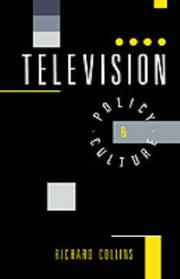| Listing 1 - 10 of 39 | << page >> |
Sort by
|

ISBN: 0748617183 0748617175 1474468268 0748680586 0748679596 0748671110 Year: 2005 Publisher: Edinburgh : Edinburgh University Press,
Abstract | Keywords | Export | Availability | Bookmark
 Loading...
Loading...Choose an application
- Reference Manager
- EndNote
- RefWorks (Direct export to RefWorks)
Television Policy offers a unique and authoritative account of the major developments in television programming and policy since 1976 by collecting in a single volume the MacTaggart lectures delivered at the Edinburgh International Television Festival across the last quarter of a century. The MacTaggart lecturers include the most celebrated and distinguished programme makers, producers, performers, playwrights, policymakers and senior media executives across all sectors of broadcasting. They include Greg Dyke, John Humphrys, John McGrath, Marcel Orphuls, Norman Lear, Jeremy Isaacs, John Mortimer, Peter Jay, Ted Turner, Jonathan Miller, Denis Foreman, John Schlesinger, Troy Kennedy-Martin, Philip Whitehead, Christine Ockrent, Rupert Murdoch, Verity Lambert, David Elstein, Michael Grade, Dennis Potter, Janet Street Porter, John Birt, Laurence Marks, Maurice Gran, Peter Bazalgette, Richard Eyre, David Liddiment and Mark Thompson. With a Foreword by John Willis and an introductory essay exploring the history of the MacTaggart lectures and a review of the shifting themes and concerns of the lectures, the book provides a forum for the significant debates which have helped to shape both television content and policy across twenty five years of considerable and unprecedented change in broadcasting. Topics covered include the future of public service programming; the relationship of government to broadcasters; the impact of ownership on the freedom of broadcasters; and debates about whether and how television should be regulated.

ISBN: 1134431945 1280070307 0203217675 9780203217672 9780415297332 0415297338 9781134431892 9781134431939 9781134431946 1134431937 Year: 2003 Publisher: London New York RoutledgeCurzon
Abstract | Keywords | Export | Availability | Bookmark
 Loading...
Loading...Choose an application
- Reference Manager
- EndNote
- RefWorks (Direct export to RefWorks)
This highly topical book exposes the tensions between state policies of broadcasting regulation and practices of civil society in the Asian region which is struggling with its incorporation into a new globalized, electronic information and entertainment world.
Television broadcasting policy --- Television broadcasting --- Telecasting --- Television --- Television industry --- Broadcasting --- Mass media --- Television broadcasting and state --- Broadcasting policy --- Government policy

ISBN: 0044457650 0044457669 Year: 1990 Publisher: London, Cambridge, MA : Unwin Hyman,
Abstract | Keywords | Export | Availability | Bookmark
 Loading...
Loading...Choose an application
- Reference Manager
- EndNote
- RefWorks (Direct export to RefWorks)
Television broadcasting policy --- Télévision --- Politique gouvernementale --- #SBIB:309H1511 --- Television broadcasting --- Television broadcasting and state --- Broadcasting policy --- Radio- en/of televisie: communicatiepolitieke aspecten (nationaal, internationaal) --- Government policy --- Television broadcasting policy. --- Télévision

ISBN: 0896804178 0896802124 9780896804173 9780896802124 Year: 2000 Publisher: Athens, OH Ohio University Center for International Studies
Abstract | Keywords | Export | Availability | Bookmark
 Loading...
Loading...Choose an application
- Reference Manager
- EndNote
- RefWorks (Direct export to RefWorks)
The culture of television in Indonesia began with its establishment in 1962 as a public broadcasting service. From that time, through the deregulation of television broadcasting in 1990 and the establishment of commercial channels, television can be understood, Philip Kitley argues, as a part of the New Order's national culture project, designed to legitimate an idealized Indonesian national cultural identity. But Professor Kitley suggests that it also has become a site for the contestation of elements of the New Order's cultural policies. Based on his studies, he further speculates on the in
Television broadcasting --- Television broadcasting policy --- Television programs --- Programs, Television --- Shows, Television --- Television shows --- TV shows --- Television broadcasting and state --- Government policy --- Electronic program guides (Television) --- Television scripts --- Broadcasting policy
Book
ISBN: 9782271078124 Year: 2005 Publisher: CNRS Éditions
Abstract | Keywords | Export | Availability | Bookmark
 Loading...
Loading...Choose an application
- Reference Manager
- EndNote
- RefWorks (Direct export to RefWorks)
While the countries of the Arab world are suffering the effects of political instability, the interest or concerns they arouse in the West have allowed the general public to discover the region's satellite channels, the most famous of which is undoubtedly Al-Jazeera. But what exactly is the impact of this medium? What role does he play? What representations does it convey? What company does he speak for? If Al-Jazeera is somewhat atypical, the temptation remains great nonetheless to oppose it to the overwhelming majority of the other chains in the region to note how much it is “democratic” and therefore… how much the others are. not…The major interest of this study is to finally go beyond the limits of this type of reasoning by taking as a starting point two postulates: the first is the need not to separate the media from the societies from which they originate (and therefore from the historical processes). that cross these societies); the second is to understand the Arab media as a system (we can only understand them and understand their mutation by analyzing how they develop in relation to each other).Emphasis is placed on the Egyptian case to illustrate the reflection and show how the evolution of a particular media system is indeed the fruit of a complex set of constraints and opportunities, coming both from within and from within. outside the national territory, and involving both the State and private sector actors. Finally a reference work in French, extremely documented, which lays the groundwork for research on Arab media.
Television broadcasting --- Television broadcasting policy --- Journalism & Communications --- Radio & TV Broadcasting --- Sociology of media - Arabic medias - Television - 20th-21st centuries. --- Television broadcasting and state --- Broadcasting policy --- Telecasting --- Television --- Television industry --- Broadcasting --- Mass media --- Government policy

ISBN: 0472109030 9780472109036 Year: 1998 Publisher: Ann Arbor, Mich. University of Michigan Press
Abstract | Keywords | Export | Availability | Bookmark
 Loading...
Loading...Choose an application
- Reference Manager
- EndNote
- RefWorks (Direct export to RefWorks)
Social problems --- Mass communications --- United States --- Violence on television --- Television broadcasting policy --- -Violence on television --- -Television violence --- TV violence --- Violence in television --- Television --- Television broadcasting --- Television broadcasting and state --- Broadcasting policy --- Congresses --- Government policy --- Congresses. --- -Congresses --- Television violence --- United States of America

ISBN: 1860205356 Year: 2000 Publisher: Luton University of Luton press
Abstract | Keywords | Export | Availability | Bookmark
 Loading...
Loading...Choose an application
- Reference Manager
- EndNote
- RefWorks (Direct export to RefWorks)
Film --- France --- United States --- #SBIB:023.AANKOOP --- #SBIB:309H1312 --- Filmwezen: bedrijfseconomische aspecten, productie- en distributiestructuren --- Motion picture industry --- Motion pictures, American --- Television broadcasting policy --- Television broadcasting --- Television broadcasting and state --- Broadcasting policy --- American motion pictures --- Moving-pictures, American --- Foreign films --- Film industry (Motion pictures) --- Moving-picture industry --- Cultural industries --- Government policy --- United States of America
Book
ISBN: 2130374158 9782130374152 Year: 1982 Publisher: Paris PUF
Abstract | Keywords | Export | Availability | Bookmark
 Loading...
Loading...Choose an application
- Reference Manager
- EndNote
- RefWorks (Direct export to RefWorks)
Politics --- Sociology of culture --- Television broadcasting --- Television broadcasting policy --- -Television broadcasting policy --- -#SBIB:309H1514 --- #SBIB:309H1522 --- Television broadcasting and state --- Broadcasting policy --- Telecasting --- Television --- Television industry --- Broadcasting --- Mass media --- Radio- en/of televisie: politieke, juridische, ethische, ideologische aspecten (bv.censuur) --- Radio- en/of televisieprogramma’s met een ideologische en spiegelfunctie --- Government policy --- #SBIB:309H1514 --- Television broadcasting - France --- Television broadcasting policy - France

ISBN: 1871516927 Year: 1997 Publisher: Exeter Intellect
Abstract | Keywords | Export | Availability | Bookmark
 Loading...
Loading...Choose an application
- Reference Manager
- EndNote
- RefWorks (Direct export to RefWorks)
TV (televisie) --- Mass communications --- Europe --- Television broadcasting policy --- Television broadcasting --- Television programs --- #SBIB:309H1500 --- #SBIB:AANKOOP --- Programs, Television --- Shows, Television --- Television shows --- TV shows --- Electronic program guides (Television) --- Television scripts --- Television broadcasting and state --- Broadcasting policy --- Radio- en/of televisie: algemene werken --- Government policy

ISBN: 2706105550 9782706105555 Year: 1994 Publisher: Grenoble Presses universitaires de Grenoble
Abstract | Keywords | Export | Availability | Bookmark
 Loading...
Loading...Choose an application
- Reference Manager
- EndNote
- RefWorks (Direct export to RefWorks)
Mass communications --- Europe --- Public television --- Television broadcasting policy --- 654.197 --- -Television broadcasting policy --- -#A9507A --- Television broadcasting --- Television broadcasting and state --- Broadcasting policy --- Non-commercial television --- Noncommercial television --- Public broadcasting --- Public service television programs --- Facsimile and television broadcasting --- Government policy --- 654.197 Facsimile and television broadcasting --- #A9507A --- Public television - Europe --- Television broadcasting policy - Europe
| Listing 1 - 10 of 39 | << page >> |
Sort by
|

 Search
Search Feedback
Feedback About UniCat
About UniCat  Help
Help News
News